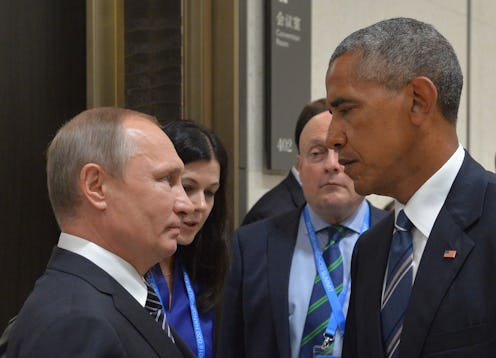News
President Obama's Retaliation Against Russia

In his final weeks at the helm of the nation, President Barack Obama is showing he's determined to send a clear message to Russia. News broke on Thursday that that the Obama administration ordered retaliatory measures against Russia for reportedly hacking and leaking emails in an effort to help Donald Trump win the presidential election. As reported by Reuters, according to an official, the United States will expel 35 Russian diplomats, giving them 72 hours to leave the country. That move, the wire service said, was reportedly in response to the "harassment of U.S. diplomats in Moscow."
It was later reported that those diplomats served the Russian embassy in Washington D.C. and the consulate in San Francisco. According to the White House, the State Department declared these diplomats "persona non grata," describing their behavior as "acting in a manner inconsistent with their diplomatic status." Russians will also reportedly be blocked from accessing compounds in New York and Maryland, which are owned by their government.
Obama announced that the United States would impose sanctions on two Russian intelligence agencies, the GRU and the FSB. As NBC News reported, there are "no new economic sanctions imposed on Russia itself or its political leadership."
Obama said in a statement:
These actions follow repeated private and public warnings that we have issued to the Russian government, and are a necessary and appropriate response to efforts to harm U.S. interests in violation of established international norms of behavior.
Obama also said that the FBI and the Department of Homeland Security will publish declassified Russian cybersecurity intel to "identify, detect, and disrupt Russia's global campaign of malicious cyber activities."
Shortly after Obama's announcement, the FBI and the Department of Homeland Security issued a joint report, concluding that the Russian civilian and military Intelligence service (RIS) sought "to compromise and exploit networks and endpoints associated with the U.S. election."
House Speaker Paul Ryan called the Obama administrations' new actions "overdue" and that "Russia does not share America's interests." He added that it was an "appropriate way to end eight years of failed policy with Russia."
On Wednesday, when news initially broke that the United States would be taking retaliatory steps against Russia, the latter country was already prepared with an aggressive response. "We can only add that if Washington takes new hostile steps, it will receive an answer," Russia's Foreign Ministry spokeswoman Maria Zakharova said in a statement. "This applies to any actions against Russian diplomatic missions in the United States, which will immediately backfire at U.S. diplomats in Russia. The Obama administration probably does not care at all about the future of bilateral relations, but history will hardly forgive it for this après-nous-le-deluge attitude."
Vladimir Putin denounced the U.S. actions against Russia shortly after they were announced. Dmitry Peskov, a spokesperson for Putin, told reporters in Moscow, "We think that such steps by a U.S. administration that has three weeks left to work are aimed at two things: to further harm Russian-American ties, which are at a low point as it is, as well as, obviously, to deal a blow to the foreign policy plans of the incoming administration of the president-elect."